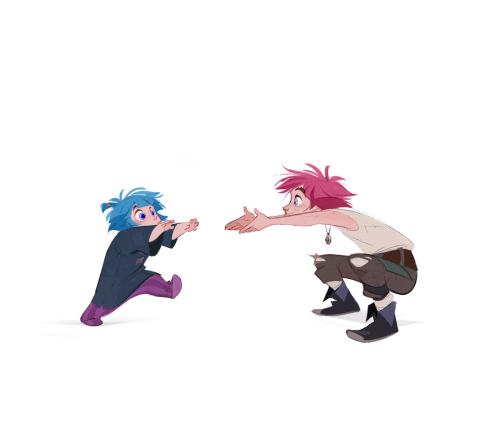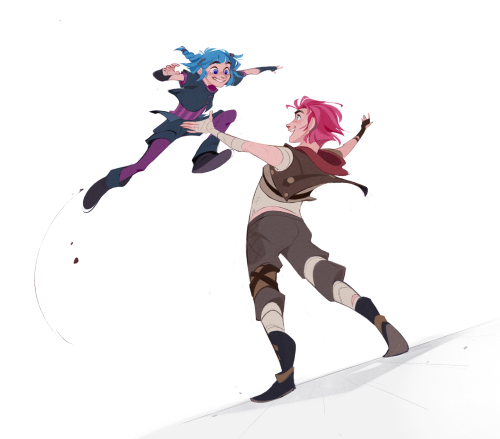Latest Posts by skurtumbly - Page 4
The Breakfast Scene - Full Transcript
More scene transcripts to share. This is the entire cutscene following Aloy leaving the art gallery, all the dialogue available from the dialogue wheel, the ending cutscene, and the short transmission from Tilda post-cutscene. I’ve also added basic scene descriptions for my own notes (some of which could be up for interpretation), as well as some screenshots I found interesting.

Keep reading

drummer vi drummer vi drummer vi
based on this fic heart rhythms written by @goldfyshie927 (band au, caitvi, fluff, amazing writing, what else could you want)



they are so scrimblo like baller skeemk and tupa🥺🥺aww scrimblo🥺🥺they are like feebee bouba🥺🥺






oh, the misery // everybody wants to be my enemy // spare the sympathy // everybody wants to be my enemy

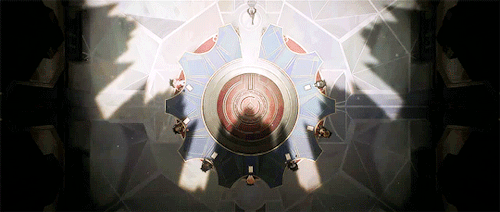

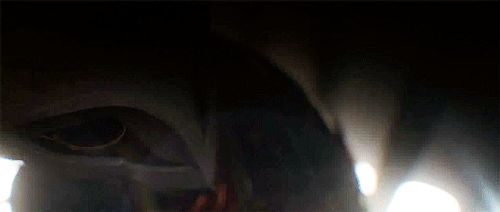

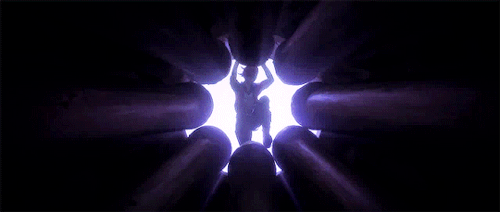

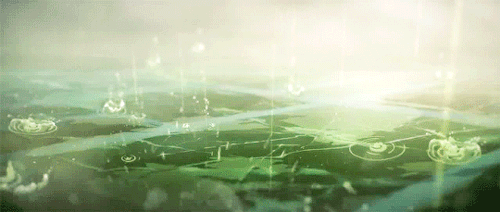

ARCANE SEASON 1 favorite shot per episode
Jinx’s Neurodiversity
Disclaimer: this analysis is coming from a late-in-life diagnosed autistic woman, who, in her autism diagnosis had her “borderline case of ADHD” from childhood confirmed as actual ADHD. (cause there is no “borderline ADHD” or “borderline autism,” you’re neurodiverse or you’re not).
Also, we can all speculate as much as we please but if the writers didn’t do their research and create the characters with that intent, this shit is just that: speculative.
Buckle up for my brain dump ❤️

1. The first meltdown
It might seem like Powder overreacted to being told “don’t come,” but neurodiverse people (overall) have a limbic system (part of brain that regulates emotion) that develops differently from neurotypical people (see: needs extra support and has a steeper learning curve). ADHD-ers especially are more likely to experience very extreme feelings to triggers–as opposed to the more emotionally disconnected alexithymia which is more prevalent in the autistic community–but both labels can experience overwhelm, meltdowns, and shutdowns just from “big feelings.”
(And this is different from bipolar which will experience extremely high highs and low lows without a stimulus that will last for days/weeks/months.)
In ADHD/autism the intense feelings are more apt to last a few minutes to a few hours and they are highly dependent on external and internal triggers. They’re not “crossed wires” or anything we could pathologize, they’re plainly very intense feelings. And again, because our nervous systems just don’t know how to process the overwhelm it can lead to meltdowns.
Breaking down Powder’s first meltdown:
-Intense reaction to being left alone for an indeterminate amount of time
-Don’t know how to process “not ready” so is aggressive/melts down around the items that relate to her “not ready”-ness (her bombs and the suitcase she packed to go with the group).
-(This part was the key for me) She realizes that she has a powerful superweapon in her possession and immediately the meltdown stops. Because we’re onto a new set of feelings now. She’s no longer distraught over not being able to contribute because she has a solution, and so those intense feelings disappear and so does the meltdown.
2. The reflexes / brain go zoom
Jinx demonstrates that she has super reflexes
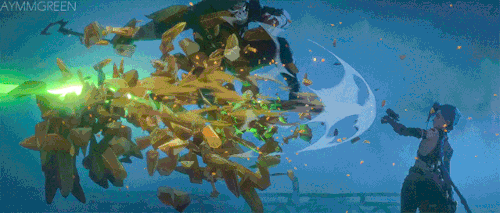
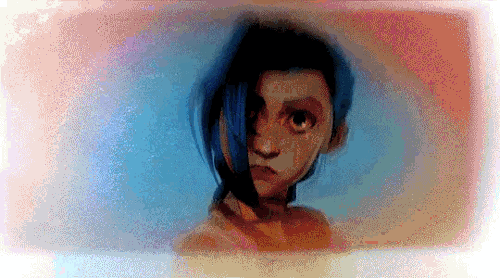
ADHD-ers, on average, have brains that work 3x as a fast as every other brain type. It’s what leads to a lot of us getting called the “gifted child” in school, but it’s not necessarily that we’re all geniuses, it’s just that our brains go zoom.
Our brains are also more likely to exhibit a kind of neuropathway (?) that bypasses a part of our brains that would otherwise be used to “edit” signals. Where most people’s brains would go “cup want. vase in the way. move around vase, now *grab cup*” ADHD brains tend to go “cup” at the same time as “grab” which makes for clumsiness and impulsivity but also super fast reflexes.
As well, I listened to a special ops on a biohacking podcast talk about how, if he had to be on the battlefield again, he’d want the person with ADHD next to him because our brains can keep up with the speed of battle with ease. Other brains are more likely to be overstimulated and have to wade through the shock first. But ADHD-ers have a speedy brain and are likely to have no problem keeping up (therefore keeping alive).
The speediness is how we can have such a high threshold for stimulation, and why we’re more likely to be that person “sucked in” by the video game or movie–our brains also like the constant stream of stimulation. And conversely, we’re the first person to whip out our phone and start multitasking as soon as there’s a slow point on the screen. ADHD brains are hungry for stimulation, and battle is fast-paced stimulation.
3. Happy-hormone starved
The way I understand it, because our brains work so fast we end up burning through dopamine/serotonin/happy hormones faster than other brains which is why we crave new stimulus constantly–it’s our brains way of chasing some happy. And again, battle is stimulating.
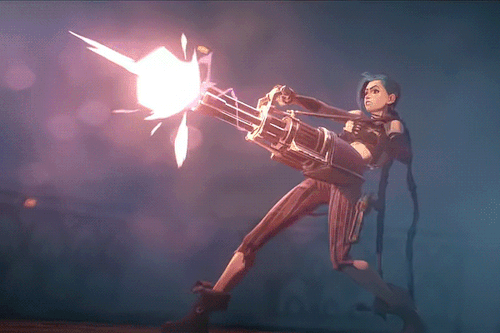
And Jinx, Jinx seems to luuurve battle. While, yes, there’s definitely a lot of validation that she gets from being the “stronger” adversary, it’s also probably something that is feeding her happy-hormone starved brain consistent hits of happy. So she likes it. Like a lot.
Edit:* There’s even evidence in this in the “romantic and elated” music that plays when her bomb is a success–it’s the same music that plays when she watches her siblings fight Decker’s gang, and we see that from her POV and the slow mo of it makes it like a dance. I think battle and violence was something she was drawn to even before she ran around intentionally committing atrocities.
4. The “blips”
The first time we see Jinx’s awareness “blip” out is during this:

She is visibly already uncomfortable and when Silco reassures her that Vi is gone. She (1) agrees, (2) blips and struggles to make a joke about sisters, (3) blips and is suddenly blowing on the needle like a whistle.
She’s dissociating. Shutting down little by little to avoid having to face the thing that’s causing her pain: the topic of Vi. I think this time the blip was to relay how her brain is processing trauma–in that it’s not processing it, but two other times it really felt more like the little manic episodes ADHD-ers can get.
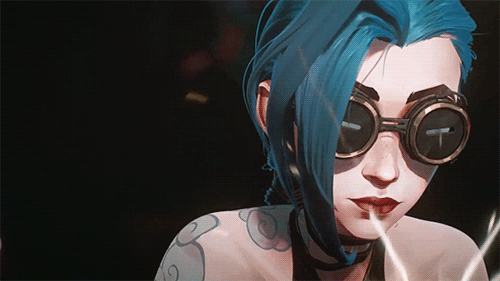
You can feel like your brain is firing on all cylinders and, like, if your brain was a train, it doesn’t matter where you’re going cause the tracks will appear the millisecond before the wheels touch the ground. They don’t last long, a few hours at most, and they happen more when you’re “in the zone” or hyperfixating on something. And these happy blips happen when Jinx is in her element (and unbothered by her PTSD). She’s low-key manic.
5. “And I thought Powder could get obsessed”
Both ADHD and autism are known for having hyperfixations. Hyperfixating is like extreme tunnel-vision, almost always on something enjoyable. Neurodiverse people can go all day without eating if they’re hyperfixated on a project, ignore all body wants and needs–literally eat breathe sleep whatever topic they are hyperfixating on.
ADHD-ers, when we like a thing we become obsessed with it as it continues to feed our brain happy hormones hits, and then a few weeks to a few months later, when it stops bringing us the happy, we drop it and move on to the next thing.
Jinx clearly has obsessions that can each be explained by other means, but Vi has that one comment to Caitlyn, “And I thought Powder could get obsessed.” This trait has been a staple in Powder/Jinx since before the incident. And if Jinx is neurodiverse, then this is how her brain has worked since she was born.
Side note: hyperfixating is different from special interests, which are hyperfixations that can last a person’s lifetime. Jinx’s obsession with bombs and shooting are probably special interests.
6. “Different”
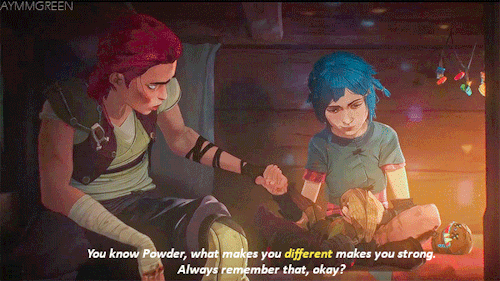
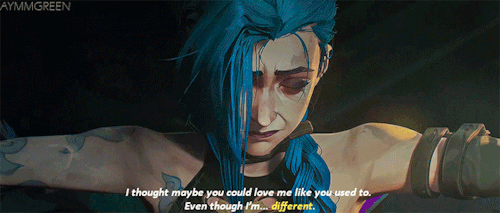
Jinx being “different” seems to be a point of contention for her throughout the season. She’s less than thrilled when Vi calls her different, and when she admits it in the last episode, it’s like with a beaten down resignation. She doesn’t want to be different; she spends the whole season trying to belong (first to the Vander-family and then she flits between her desperation to be loved by Silco and loved by Vi).
And this is one of the biggest complaints about autism; that because we are so different, we feel chronically lonely. We’re more likely to feel on the outs and like we just cannot connect and bond with others, even when we are actively participating or are with people we get along well with. It also means we’re going to be the person who doesn’t get the same fulfillment or feel the same ease when we are with other people. In my experience, the person at the party who wanders away from the crowd to go explore other rooms, or the person to break off from the conversation to sit at the table first is always neurodivergent (usually that person is me, but the rare times it’s not it’s another autie or ADHD-er). This inherent disconnect that happens, socially, makes us less apt to stick to the group and more apt to seek comfort or stimulation elsewhere.
Several times we see Powder wandering off on her own. The first time is in Jayce’s apartment; Vi, Claggor, and Mylo stick together in the main room and Powder wanders away to explore. Another time is in the arcade when Powder completely decimates Mylo in the gun game. Instead of sticking around to claim her victory, or anything you’d expect from a kid who just destroyed someone who’s been low-key bullying her, she sticks her tongue out at him and wanders away.
7. Comorbid diagnoses with neurodiversity
If you drew a circle around all of the overlapping symptoms of ADHD and Autism, and then another circle around symptoms of trauma, you’d have almost one solid circle. ADHD and Austim have a lot of overlap, and most of those symptoms are also symptoms of trauma because being neurodiverse in a neurotypical world is inherently traumatizing.
A large portion of the neurodiverse demographic have additional diagnoses of things like PTSD, schizophrenia, bipolar disorder, etc. I think one major factor in how prevalent comorbid diagnoses are, is that the daily trauma continues to compound until our brains have no choice but to alter our brain chemistry into something to seriously pathologize.
And Jinx bby has been through two serious traumas which, when compounded on top of potential neurodiversity, would explain how her mental health got to be so irreparably far gone by the time Act II starts (even though she wasn’t the only one dealing with the aftermath of the incident, and pretty much every fissure folk has been through an insane amount of pain, too).
This reddit post, btw, had a good talk about Jinx’s probable schizophrenia. From her “clang association” and “word salad” (as featured in “you’re a class act sister. sister, thought I missed her. bet you wouldn’t miss her.”), her paranoia, restlessness, and of course what we all associated with Jinx’s manifested mental illness: the hallucinations.

The last thing I want to point out is in the first scene: we don’t see Powder emotionally react to mom and dad dying. We see Vi break down and we watch Powder comfort her sister. Does Powder ever process her parents death?? Probably not! Which is so wildly unhealthy.
I think her not mourning mom and dad was the first crack in the bedrock of her psyche that that made for the choices and clear mental illness throughout the rest of the show. And that bedrock cracked as deeply as it did (and is as unfixable as it is) because she was probably neurodivergent from the start (plus the lanes don’t have therapy).
So…
Thank you for coming to my TEDtalk.

Finally finished both of them 🙏
Buy this (or either of them separately!) on my redbubble shop!
















